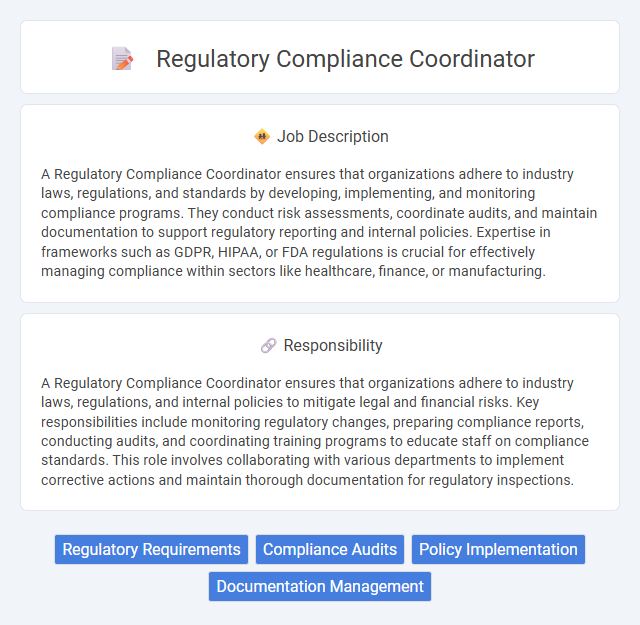
A Regulatory Compliance Coordinator ensures that organizations adhere to industry laws, regulations, and standards by developing, implementing, and monitoring compliance programs. They conduct risk assessments, coordinate audits, and maintain documentation to support regulatory reporting and internal policies. Expertise in frameworks such as GDPR, HIPAA, or FDA regulations is crucial for effectively managing compliance within sectors like healthcare, finance, or manufacturing.
Individuals with strong attention to detail and a passion for adhering to laws and regulations are likely to be suitable for a Regulatory Compliance Coordinator role. People who thrive in structured environments and can manage multiple compliance-related tasks simultaneously might find this job aligns well with their skills. Conversely, those uncomfortable with frequent updates to regulatory standards or high accountability may find the role challenging.
Qualification
Regulatory compliance coordinators typically require a bachelor's degree in fields such as business administration, law, or healthcare management, coupled with certifications like Certified Regulatory Compliance Manager (CRCM) or Certified Compliance and Ethics Professional (CCEP). Proficiency in understanding federal, state, and industry-specific regulations is essential for ensuring organizational adherence and mitigating risks. Strong analytical skills, attention to detail, and experience with compliance software enhance the effectiveness of regulatory compliance coordinators.
Responsibility
A Regulatory Compliance Coordinator ensures that organizations adhere to industry laws, regulations, and internal policies to mitigate legal and financial risks. Key responsibilities include monitoring regulatory changes, preparing compliance reports, conducting audits, and coordinating training programs to educate staff on compliance standards. This role involves collaborating with various departments to implement corrective actions and maintain thorough documentation for regulatory inspections.
Benefit
Regulatory compliance coordinator roles likely offer benefits such as enhanced professional expertise in navigating complex legal frameworks, which can increase job security and career advancement opportunities. Working in this position may provide exposure to diverse industries, fostering valuable skills in risk management and internal auditing. Employees could also experience job satisfaction from ensuring organizational adherence to laws and regulations, contributing to overall business integrity and operational success.
Challenge
Regulatory compliance coordinator roles likely involve navigating complex and ever-changing laws and industry standards, creating a challenging environment that demands continuous learning and adaptability. The probability of facing intricate documentation and rigorous audit processes requires strong attention to detail and organizational skills. Managing potential risks and ensuring company-wide adherence to regulations present ongoing challenges that test problem-solving abilities and communication effectiveness.
Career Advancement
Regulatory compliance coordinators play a crucial role in ensuring organizations adhere to industry standards and legal requirements, which strengthens their expertise in risk management and governance frameworks. Mastery in regulatory frameworks such as FDA, GDPR, or SOX certification provides significant career advancement opportunities, leading to senior roles like compliance manager or director of regulatory affairs. Continuous professional development and specialized training in compliance technologies and audit processes further enhance prospects for leadership positions in highly regulated industries.
Key Terms
Regulatory Requirements
A Regulatory Compliance Coordinator ensures adherence to industry-specific regulatory requirements such as FDA, OSHA, or GDPR standards, facilitating accurate documentation and reporting. They monitor changes in laws and regulations, implementing necessary updates to internal policies and procedures to maintain compliance. Their role is critical in mitigating legal risks and supporting audits and inspections by regulatory authorities.
Compliance Audits
Regulatory compliance coordinators oversee compliance audits to ensure organizational adherence to federal and state regulations. They design audit schedules, review internal processes, and compile detailed reports highlighting areas of risk or non-compliance. Expertise in regulatory frameworks such as FDA, OSHA, or GDPR is essential to maintain operational integrity and mitigate potential legal penalties.
Policy Implementation
A Regulatory Compliance Coordinator ensures effective policy implementation by monitoring adherence to legal standards and organizational regulations. This role involves developing, updating, and enforcing compliance policies to minimize risks and promote operational consistency. Coordination with internal departments and external regulatory bodies is essential for accurate policy alignment and timely reporting.
Documentation Management
A Regulatory Compliance Coordinator specializes in documentation management by ensuring all regulatory filings, records, and compliance documents are accurately maintained and easily accessible for audits. They develop and implement robust document control systems to track revisions, approvals, and expiration dates in accordance with industry standards such as FDA, EMA, or ISO regulations. Efficient documentation management by the coordinator minimizes compliance risks and supports seamless regulatory submissions and inspections.
 kuljobs.com
kuljobs.com